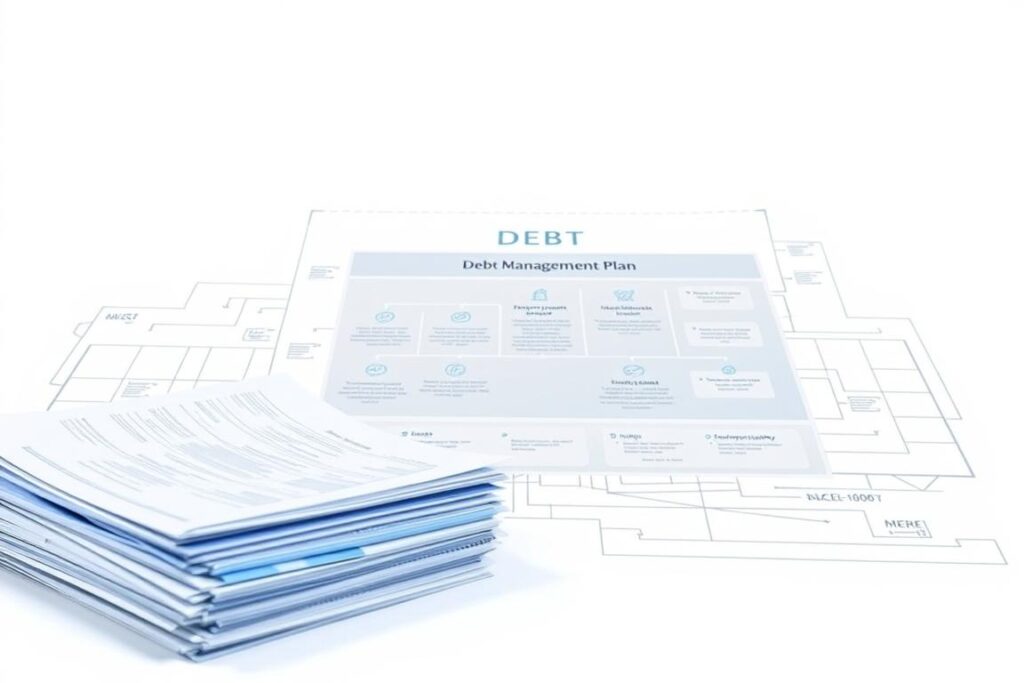Are you struggling to keep up with your monthly payments and feeling overwhelmed by your financial obligations? You’re not alone.
According to Experian, total consumer debt rose more than 4.4% from 2022 to 2023. Credit card balances grew by 17.4% in 2023. This shows how critical effective debt management and credit counseling are.
We will share practical tips and strategies. They will help you overcome financial challenges. You’ll learn how to achieve financial freedom through debt consolidation and smart financial planning.
Key Takeaways
- Understand the importance of managing your finances effectively
- Learn how to develop a plan to manage your financial obligations
- Discover practical tips for achieving financial freedom
- Explore strategies for effective debt consolidation
- Find out how credit counseling can help you
Understanding Debt Management: What It Is and Why It Matters
In today’s world, managing debt is key to staying financially healthy. Debt management means knowing your debt, making a plan to pay it off, and avoiding more debt. It’s a vital skill for anyone.
Definition of Debt Management
Debt management covers all ways to lower your debt, like loans and other financial obligations. It involves financial planning and strategies for debt relief and debt settlement. Good debt management lets you take back control of your finances.
Common Types of Debt
People often face different types of debt. These include:
- Credit card debt
- Student loans
- Personal loans
- Mortgages
Knowing what debt you have is key to making a debt management plan.
Importance of Effective Debt Management
Managing debt well is essential for financial stability. It reduces stress, improves credit scores, and keeps you out of debt traps. Good debt management leads to better financial planning and a stable future.
| Type of Debt | Characteristics | Interest Rate |
|---|---|---|
| Credit Card Debt | Revolving, high-interest | High (15%-30%) |
| Student Loans | Fixed, long-term | Low-Moderate (4%-8%) |
| Personal Loans | Fixed, varied terms | Moderate (6%-12%) |
| Mortgages | Secured, long-term | Low-Moderate (3%-6%) |
Signs You Need Help with Debt Management
Knowing when you need help with debt is key to getting back on track financially. It’s hard to know where to begin or when to ask for help when dealing with debt. Yet, there are clear signs that show it’s time to look at your finances again and get help.
Accumulating Late Fees
Getting hit with late fees is a big warning sign. These fees add up and can hurt your credit score. If you’re always late or miss payments, it’s time to rethink your budget and debt plan.
Struggling to Make Minimum Payments
Having trouble making the minimum payments is another warning. Not making enough progress on your debt means it will take longer to pay off. It also means you’ll pay more in interest. We need to find better debt reduction strategies to get back on track.
Credit Score Decline
A drop in your credit score is a serious sign you need to improve your debt management. Your credit score is based on how you pay bills, how much credit you use, and other debt-related factors. If your score is falling, it could be because of late payments or high credit use. It’s important to understand why and fix it.
| Sign | Description | Impact |
|---|---|---|
| Accumulating Late Fees | Consistently paying bills late or missing payments | Increases debt, negatively affects credit score |
| Struggling to Make Minimum Payments | Barely covering minimum payments on debts | Longer payoff period, more interest paid over time |
| Credit Score Decline | Drop in credit score due to debt-related issues | Affects ability to secure loans, credit cards |
By spotting these signs and acting early, we can create a better debt management plan. This might mean getting professional advice, using new budgeting tips, or finding debt reduction strategies that fit our situation.
Developing a Debt Management Plan
Creating a debt management plan is a step-by-step process. It helps us tackle debt and improve our financial health. This plan is made just for us, based on our financial situation and goals.
Assessing Your Current Financial Situation
To make an effective debt management plan, we first need to understand our finances. We must look at our income, expenses, debts, and credit score. This helps us see where we can improve.
We gather all our financial documents, like pay stubs and bank statements. We list our income and expenses, and all our debts. This includes credit card balances and loans.
Setting Clear Financial Goals
Setting clear financial goals is key. These goals should be specific, measurable, achievable, relevant, and time-bound (SMART). For example, we might aim to pay off a certain amount of debt in a year.
SMART goals help us stay focused and track our progress. Our goals could be to reduce our debt, improve our credit score, or build an emergency fund.
Creating a Budget
Creating a budget is a critical step in managing debt. A budget helps us track our income and expenses. It shows us where we can cut back and how to pay off debt.
A good budget covers all necessary expenses, like housing and food. It also includes debt payments. By prioritizing expenses and making adjustments, we can save more for debt repayment.
| Category | Monthly Income/Expense | Percentage of Income |
|---|---|---|
| Income | $4,000 | 100% |
| Fixed Expenses | $2,000 | 50% |
| Debt Payments | $800 | 20% |
| Savings | $200 | 5% |
| Entertainment | $400 | 10% |

By following these steps and creating a detailed debt management plan, we can take control of our finances. This leads us towards a debt-free future.
Debt Reduction Strategies You Should Consider
Managing debt well means knowing the different ways to cut down on what you owe. Having a solid plan is key. We’ll look at three main strategies to help you handle your debt.
Snowball Method
The debt snowball method is about paying off the smallest debts first. You keep making minimum payments on the rest. This method gives you a quick win by clearing small debts fast.
To start, list your debts from smallest to largest. Pay off the smallest one first. Then, use the money to tackle the next debt on your list.
Debt Avalanche Method
The debt avalanche method focuses on paying off debts with the highest interest rates first. This way, you save more money on interest over time compared to the snowball method.
First, list your debts by their interest rates from highest to lowest. Pay off the one with the highest interest rate first. This method takes discipline but can save you money.
Consolidation Loans
Consolidation loans combine multiple debts into one, often with a lower interest rate. This makes managing your debt easier and can save you on interest.
When looking at consolidation loans, compare rates and terms from different lenders. This helps you find the best deal. But, watch out for loans with hidden fees or bad terms.
Each strategy has its benefits and works differently for everyone. It’s important to think about your financial goals and choose what fits best for you.
The Benefits of Working with a Credit Counselor
Credit counseling can change lives for those with debt. It offers a full plan for managing money. With a credit counselor, you get expert advice to tackle financial problems.
One big plus of credit counseling is the professional guidance and support you get. Counselors help you understand your money situation. They show you how to manage your debt better.
Expert Guidance for Customized Plans
Credit counselors create customized debt management plans for you. These plans fit your needs and goals. This way, you get the right help to beat your debt.
Improving Financial Literacy
Credit counselors also teach you to manage money better. They help you improve your financial literacy. This means you can make smart choices with your money.
Working with a credit counselor is a smart move for managing debt. They offer the guidance and support you need. This helps you build a strong financial future.
Importance of Building an Emergency Fund
Having a savings account ready can greatly help with managing debt. An emergency fund is money set aside for unexpected costs, like car repairs or medical bills. It prevents you from going deeper into debt when emergencies happen.
How an Emergency Fund Helps in Debt Management
An emergency fund acts as a safety net against sudden expenses. This way, you don’t have to take on more debt when unexpected costs come up. For example, if your car breaks down, you can use your emergency fund for repairs instead of using a credit card or getting a loan.
Steps to Create an Emergency Fund
To start an emergency fund, first figure out how much you need. Aim to save three to six months’ worth of living expenses. Next, open a separate savings account just for your emergency fund.
Begin by saving a little each week, like $10 or $20. Gradually increase the amount as you can.
| Step | Description | Action |
|---|---|---|
| 1 | Determine the amount to save | Calculate three to six months’ worth of expenses |
| 2 | Set up a separate savings account | Open a savings account specific for the emergency fund |
| 3 | Start saving regularly | Begin with small, manageable amounts, such as $10 or $20 per week |

Best Practices for Saving
To save well, automate your savings by setting up automatic transfers. Don’t use your emergency fund for non-essential things. Also, keep your emergency fund in a high-yield savings account to earn interest.
By following these steps and tips, you can build a strong emergency fund. It will help you manage your debt and reach financial stability.
Staying Motivated During Debt Repayment
It’s tough to stay motivated when paying off debt. But, with the right strategies, we can reach financial freedom. Keeping a positive mindset and focusing on our goals is key.
Recognizing and celebrating our progress is vital. It boosts our morale and helps us keep going.
Celebrating Small Wins
Celebrating small victories is a big motivator. Acknowledging each step towards debt freedom is important. For example, paying off a credit card or avoiding overspending for a month are big wins.
- Paying off a credit card balance
- Completing a month without overspending
- Reaching a debt repayment milestone
Finding Accountability Partners
Having someone to report to boosts our motivation. This could be a friend, family member, or financial advisor. They should understand our goals and offer support.
Accountability partners help us stay on track. They review our budget, offer encouragement, and suggest improvements.
Keeping Your Goals Visible
Keeping our goals in sight is essential. Regularly reviewing them helps us stay focused. It reminds us why we’re working to be debt-free.
| Strategy | Motivational Benefit | Implementation Ease |
|---|---|---|
| Celebrating Small Wins | High | Easy |
| Finding Accountability Partners | Medium to High | Moderate |
| Keeping Goals Visible | High | Easy |
By using these strategies, we can stay motivated. It’s about finding a long-term approach that works for us.
Avoiding Common Debt Management Mistakes
Managing debt well means more than just making a plan. It’s also about avoiding mistakes that can ruin it. Knowing the common pitfalls helps us stay on track and reach financial stability.
One big mistake is ignoring credit card statements. Missing payments and late fees can hurt your credit score. Checking your statements regularly keeps you informed and in control of your debt.
Overlooking the Importance of Credit Card Statements
Ignoring your credit card statements can lead to trouble. It can cause late fees and lower your credit score. Make it a habit to review your statements often. This way, you can spot errors and stay updated on your debt.
The Dangers of Not Seeking Help When Needed
Not asking for help when needed is another mistake. Many people try to handle debt alone, missing out on valuable advice. Credit counselors and financial advisors offer personalized help to guide you through debt management.
The Pitfalls of Making Only Minimum Payments
Only paying the minimum on debts can make repayment take longer. It might seem easier, but it costs more in interest over time. Try to pay more than the minimum to pay off your debt faster and save on interest.
| Common Debt Management Mistakes | Consequences | Solutions |
|---|---|---|
| Ignoring Credit Card Statements | Late fees, credit score decline | Regularly review statements |
| Not Seeking Help When Needed | Accumulating more debt | Consult credit counselors or financial advisors |
| Making Only Minimum Payments | Longer debt repayment period | Pay more than the minimum payment |
Knowing these common mistakes and how to avoid them helps create a better debt management plan. Being informed and proactive is essential for financial stability.
Resources for Effective Debt Management
There are many resources to help manage debt well. It’s not just about making a plan. We also need the right tools and support to follow it.
Online Tools and Apps
Online tools and apps can track our spending, make budgets, and watch our debt. They give us updates and alerts to keep us on track. For example, apps like Mint and You Need a Budget (YNAB) help manage our finances.
Financial Education Programs
Financial education programs are key for managing debt. They can be online or in-person. They teach us about budgeting, saving, and credit scores.
By joining these programs, we learn more about our finances. We can then make plans to improve our financial health.
Community Resources and Support
Community resources and support groups are also important. They give us the motivation and help we need to pay off debt. Support groups, online or in-person, let us share our stories and learn from others.
Moving Forward After Debt Management
After finishing a debt management plan, we’ve made a big step towards financial stability. Now, we need to focus on rebuilding our financial health. This will help us keep the progress we’ve made.
Rebuilding Credit
It’s key to rebuild our credit score for better financial health. We can do this by paying on time and keeping our credit use low. These steps are important for managing debt well.
Creating a Long-term Financial Plan
Having a solid financial plan is essential to avoid more debt. By making a budget and setting financial goals, we align our planning with our needs. This ensures our financial planning meets our objectives.
Maintaining Good Financial Habits
Keeping up good financial habits is critical for long-term stability. By sticking to our plan and checking our credit score often, we stay on track. This helps us meet our debt management goals.



